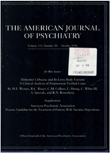A longitudinal study of Alzheimer's disease: measurement, rate, and predictors of cognitive deterioration
Abstract
OBJECTIVE: This study measured the annual rate of cognitive change in patients with Alzheimer's disease and determined the effects of clinical variables on that rate. It also compared the ability of two cognitive scales to measure change over the entire range of dementia severity. METHOD: The cognitive subscale of the Alzheimer's Disease Assessment Scale and the Blessed test for information memory and concentration were given to 111 patients with Alzheimer's disease and 72 nondemented elderly comparison subjects at 6-month intervals for up to 90 months. Longitudinal changes in scores on the cognitive subscale were measured with several different methods of data analysis. RESULTS: For the patients with Alzheimer's disease, the annual rate of change in cognitive subscale scores showed a quadratic relationship with dementia severity in which deterioration was slower for mildly and severely demented patients than for patients with moderate dementia. Gender, age at onset, and family history of dementia had no effect on the rate of cognitive deterioration. The comparison group showed a slight improvement in cognitive performance over time. All data analytic methods gave similar results. The cognitive subscale of the Alzheimer's Disease Assessment Scale was more sensitive to change in both mild and severe dementia than was the Blessed test. CONCLUSIONS: These results suggest that cognitive deterioration is slow during the early and very late stages of Alzheimer's disease and more rapid during the middle stages. No clinical variables other than degree of cognitive impairment and previous rate of cognitive decline predicted rate of deterioration. These results have implications for treatment trials and attempts to identify subgroups.
Access content
To read the fulltext, please use one of the options below to sign in or purchase access.- Personal login
- Institutional Login
- Sign in via OpenAthens
- Register for access
-
Please login/register if you wish to pair your device and check access availability.
Not a subscriber?
PsychiatryOnline subscription options offer access to the DSM-5 library, books, journals, CME, and patient resources. This all-in-one virtual library provides psychiatrists and mental health professionals with key resources for diagnosis, treatment, research, and professional development.
Need more help? PsychiatryOnline Customer Service may be reached by emailing [email protected] or by calling 800-368-5777 (in the U.S.) or 703-907-7322 (outside the U.S.).



